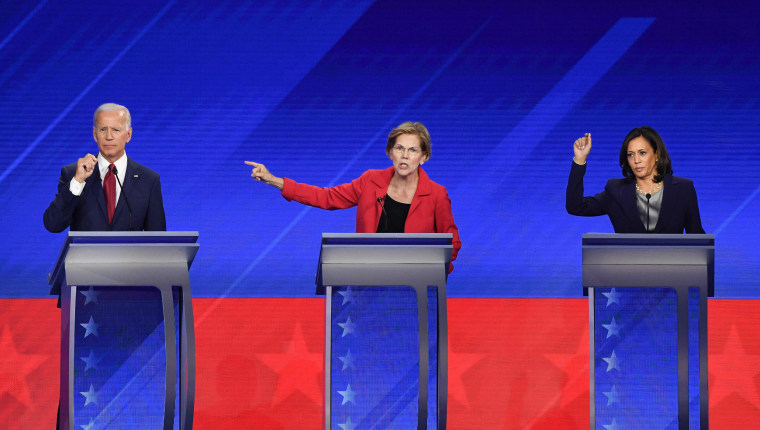I routinely tell my students that anger and fear are the strongest motivators at the polls.
Accordingly, Republicans, particularly President Donald Trump, often speak in terms of loss. If the other side is elected, they warn, they will take away your guns, take away the doctors you like and take away the Supreme Court conservative majority.
What suited candidate Trump’s needs in 2016 was a type of engagement that eviscerated opponents.
The threat of these losses generates anger and fear, and because Trump focuses attention on himself and not the Republican Party writ large, he curates followers and projects himself, not the party, as the best solution to their dissatisfaction. This is a critical point because Trump can thereby craft the rules of engagement to suit his needs.
And what suited candidate Trump’s needs in 2016 was a type of engagement that eviscerated opponents on the debate stage by assigning high-profile Republicans nicknames meant to demean and discredit. Who can forget Lying Ted, Low-Energy Jeb or Little Marco?
The effectiveness lies in the simplicity. Much of America already believed Washington was corrupt, inept and unconcerned about the lives of everyday Americans. Ratings for Congress were near an all-time low. Political psychology suggests that when a voter has an unformed or unsubstantiated idea at the back of his or her mind, a credible voice within a political or social network, or from a trusted source — like a candidate on a presidential debate stage — can turn that original notion into actionable behavior. For Republicans, Trump turned latent anger at the status quo into a vote.
In short, Trump became president by demolishing behavioral and communication norms. And now there is a temptation for Democrat presidential candidates to follow suit, particularly as there are examples that suggest this approach can work for them as well.
When Sen. Kamala Harris of California attacked former Vice President Joe Biden at the first debate on the issue of busing, the education policy’s controversial implementation took a back seat to the implication that Biden had a bad record on issues of race, which was a concern for those upset at the effects of the 1994 crime bill he aggressively supported as a senator. Harris got a bump in the polls the following week.
Harris then found herself a target at the next debate when Rep. Tulsi Gabbard of Hawaii questioned her record as a prosecutor — something black voters had been whispering about since she entered the race. Harris’ spike in support quickly evaporated. And of course most recently, after many gaffes and awkward public statements by Biden, his age was called into question at the third debate by Julián Castro, the former secretary of Housing and Urban Development.
Yet ultimately, the best Democratic communicators promote a sense of shared fate. We’re all in this together. This shared identity generates enthusiasm around social and political movements inherent in presidential campaigns. Can Democrats win by abandoning this strategy and going low when Republicans go low? Probably not.
While the temptation is palpable, Democrats should refrain from engaging in Trumpian tactics lest they risk losing their most loyal voters and drawing the ire of former President Barack Obama himself, who remains a hugely popular figure among Democrats. They should instead continue to adhere to the mantra of his wife, Michelle: “When they go low, we go high.”
The Democratic Party, for better or worse, has cultivated an image of voters and leaders with higher educational attainment, whose approach to campaigns and governance is more cerebral. We’re the party of elites that focuses on policy solutions and not emotional attachment. We speak in more aspirational tones — about what could be, as opposed to grieving what used to be (i.e., Make America Great Again).
Our shared fate lies in the dreams for our country’s progress and brilliance (Hope and Change), and thus Democratic candidates will incur some penalty for attacks against one of their own. Consider that Castro’s shot at Biden’s age engendered empathy for Biden while, for some pundits, Castro stepped over a line.
In contrast, the typical conservative message of personal responsibility isolates a voter’s decisions about voting. The voter is encouraged to consider loss of ownership: Someone is going to take away my rights, my guns, my job, etc. To be clear, this shouldn’t be construed to negatively connote selfishness but rather seen as an appeal to individual self-interest. Democratic shared fate and shared identity, on the other hand, is a protective skin in which the party wraps its stakeholders and layers between itself and democratic institutions to perpetuate norms — sometimes to the detriment of encouraging passion among our supporters.
While the temptation is palpable, Democrats should refrain from engaging in Trumpian tactics lest they risk losing their most loyal voters.
Sen. Bernie Sanders of Vermont is a notable exception. He focuses less on protecting established leaders and wants to upend institutions and their standard-bearers. Like Trump, he’s tapped into low support for government but diverges from the president by promising to rebuild the party with a vision that embraces and privileges collective need and collective solutions, e.g., affordable college and universal health care.
Perhaps he and Biden are the only candidates whose unscripted remarks still seem authentic in a Democratic context. But even so, some rules of engagement still apply. As the primary season pushes into its pre-Iowa caucuses stretch, we will see more differentiation among Democrats and sharper elbows, but we need to be careful not to adopt the language and style of our opponent. Doing so will only galvanize Trump’s support and tamp down our own. The party faithful will punish us for being less like who we are and more like who he is.



